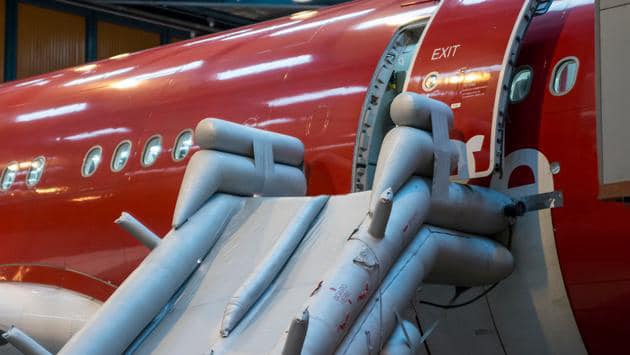17,418 total views
Homily for Friday of the 32nd Wk in Ordinary Time, 17 Nov 2023, Lk 17:26-37

I wonder if you ever pay attention to the briefing routinely given by the flight crew in all airlines before departure. Part of it is actually a set of do’s and don’ts in case the airplane is forced to make an emergency crash landing. That part in the announcement of course uses a euphemism. The stewardess shifts to a very sweet voice as she says, “In the most unlikely event of an emergency water landing…” You will never hear them actually say, “In case the pilot is forced to make a crash landing on a sea or an ocean, presuming that the plane does not plunge right into the water and either implode or explode…” You hear none of that kind of language because it can cause undue anxiety on the passengers.
But they are obliged to give the passengers some instructions about disaster-preparedness anyway. Like, presuming the pilot succeeds in making the plane land on water in an emergency situation, the passengers have to know that, before the plane begins to sink, while it is still floating, the ones seated near the emergency exit doors must be able to open the emergency exit doors, pull some contraption that will make the rubber slides pop up and get automatically inflated so that the passengers, who are supposed to know already how to put on a life-vest and inflate it, as per earlier instruction, can take turns jumping on the rubber slide from the exit door straight into the seawater.
Take note, you are also instructed to exit without bringing anything with you—no bag, no hand-carried luggage, no gadgets, just yourself. I did not realize that this was an age-old principle in disaster-preparedness orientations. Listen to how the Gospel writer puts it: “On that day, someone who is on the housetop and whose belongings are in the house MUST NOT GO DOWN TO GET THEM, and likewise on who is in the field MUST NOT RETURN TO WHAT WAS LEFT BEHIND.
The split-second instance of attempting to come down or return to retrieve some belongings could mean death, or could be the determining factor for survival. Furthermore, the evangelist says, “REMEMBER THE WIFE OF LOT.” What did she fail to do that made her turn into a pillar of salt? She forgot the intruction, NOT TO LOOK BACK or attempt to go back for some belongings, that split-second decision that could compromise the possibility of survival.
You know that we are nearing the end of the liturgical season when we begin to hear about end times again in the Gospels and the warnings about the kind of mindfulness or alertness that we need, in order to be able to face unforeseen events and survive disasters, along with the readiness to LET GO OF EVERYTHING. Just a few days more and we’re entering again into a new liturgical season we call ADVENT. Sayang naman, if we turn Advent into a mere prelude to the Christmas festivities. It is supposed to be quite the opposite of the mood of festivity; it is rather the much-needed time for fasting, and praying and the opportunity to meditate on the thought that everything in this world is passing. End time reckoning is the only thing that can truly prepare us for new beginnings, for a rebirthing, for a second coming—not with fear and trembling but rather with hope and an inner sense of equanimity.


















